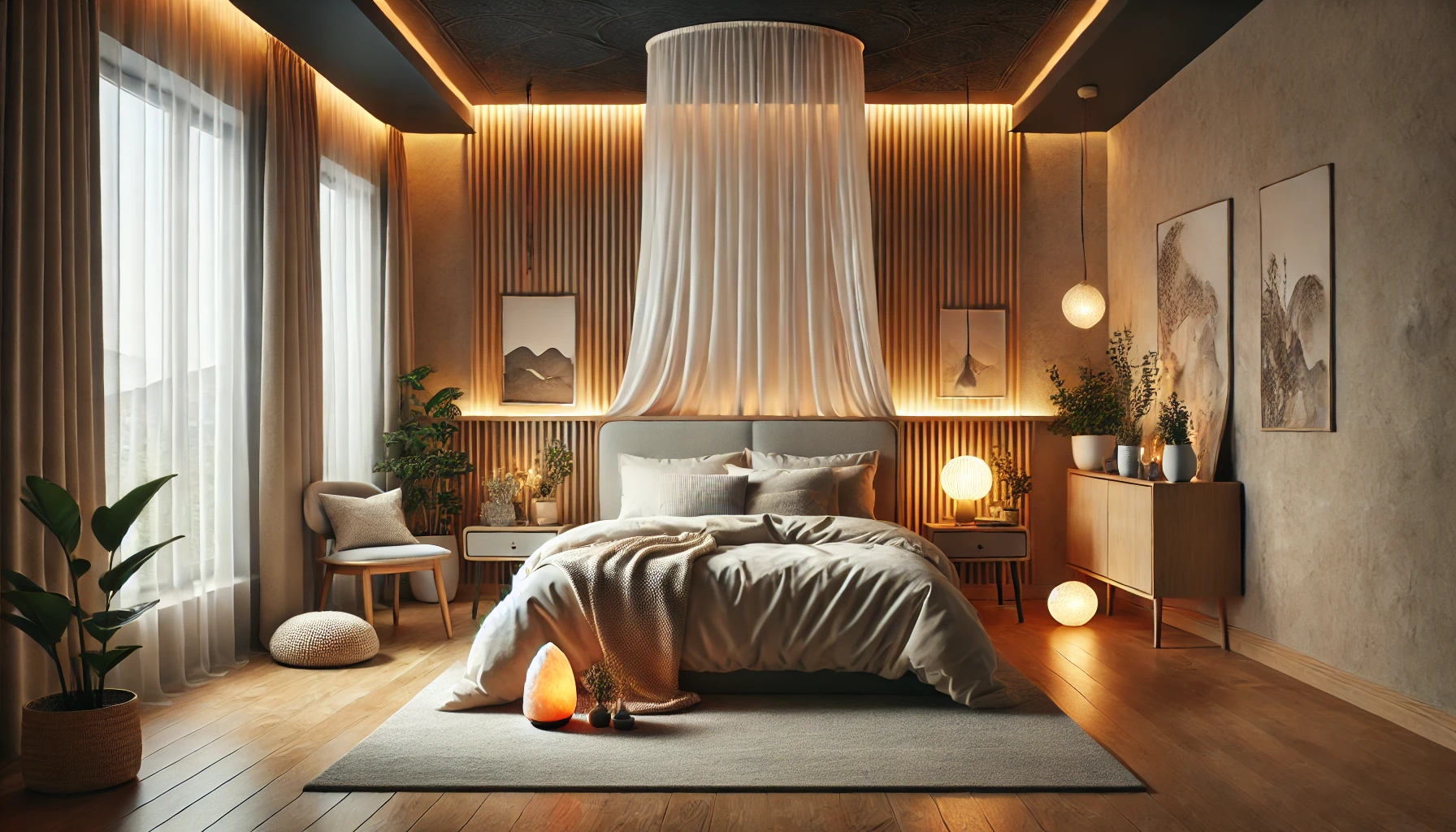How to Use Feng Shui to Improve Sleep Quality and Restfulness in Your Bedroom
A well-balanced bedroom supports deep, restorative sleep and promotes relaxation. Feng Shui principles can help create a peaceful environment by improving energy flow, reducing stressors, and enhancing comfort. By optimizing furniture placement, choosing soothing colors, and incorporating sleep-enhancing elements, you can transform your bedroom into a restful sanctuary.
1. Activate the Restful Energy of the Bedroom (Yin Energy Balance)
Feng Shui emphasizes the balance of yin (calm, passive energy) and yang (active energy) for better sleep.
- Use soft, warm lighting, reinforcing relaxation
- Decorate with calming colors, such as beige, soft blues, and muted greens
- Minimize electronic devices, reducing stimulating yang energy
- Incorporate plush textiles, such as soft rugs, curtains, and bedding, enhancing comfort
2. Place the Bed in the Command Position
The way your bed is positioned affects sleep quality and emotional security.
- Position the bed against a solid wall, reinforcing stability and support
- Ensure you can see the bedroom door while lying in bed, but avoid direct alignment
- Keep both sides of the bed open and accessible, promoting balance and harmony
- Use a sturdy headboard, providing energetic grounding and security
3. Declutter to Reduce Mental Overload and Improve Sleep
A cluttered bedroom creates mental stress and restlessness.
- Remove unnecessary furniture and decor, ensuring an open, breathable space
- Keep nightstands clean and organized, preventing distraction
- Store clothes, books, and electronics neatly, avoiding energetic disruption
- Regularly refresh your space by deep cleaning and decluttering storage areas
4. Use Soothing Colors for Better Sleep and Relaxation
Colors influence emotions and sleep quality.
- Soft blues and greens – Promote relaxation and deep rest
- Neutral tones (beige, taupe, warm gray) – Reinforce comfort and grounding
- Lavender and pastel pinks – Encourage calmness and emotional healing
- Avoid bright reds, neon colors, or harsh contrasts, which can overstimulate the mind
5. Incorporate Natural Elements for a Restful Atmosphere
Nature-based decor enhances emotional well-being and relaxation.
- Add air-purifying plants, such as lavender, snake plants, or aloe vera, improving air quality
- Use wooden furniture and organic fabrics, creating warmth and comfort
- Display nature-inspired artwork, such as serene landscapes or ocean scenes, reinforcing tranquility
- Avoid thorny or spiky plants, which can create energetic sharpness and disrupt rest
6. Optimize Lighting to Support the Body’s Sleep Cycle
Lighting plays a crucial role in preparing the body for sleep.
- Use soft, warm lighting in the evening, signaling relaxation
- Install blackout curtains, reducing outside light and creating a dark sleep environment
- Avoid harsh overhead lighting before bedtime, opting for bedside lamps instead
- Minimize exposure to blue light from screens, preventing melatonin suppression
7. Reduce Noise Disruptions for Deep Sleep
Sound can affect relaxation and sleep cycles.
- Play white noise, soft instrumental music, or nature sounds, promoting deep rest
- Use heavy curtains, rugs, and upholstered furniture, absorbing disruptive sounds
- Place wind chimes near windows, encouraging a gentle and calming energy flow
- Keep the bedroom door closed at night, maintaining a protected, undisturbed sleep space
8. Use Aromatherapy to Promote Relaxation and Deep Rest
Scents can enhance relaxation and support better sleep.
- Diffuse lavender, chamomile, or sandalwood essential oils, reducing stress and anxiety
- Use vanilla or jasmine scents, encouraging comfort and emotional stability
- Keep scented candles or herbal sachets near the bed, reinforcing a peaceful atmosphere
- Avoid overpowering artificial fragrances, opting for light and natural scents
9. Remove Sleep Disruptors for a Healthier Bedroom Environment
Certain Feng Shui imbalances can negatively impact sleep.
- Avoid placing mirrors facing the bed, as they can create restlessness
- Do not store objects under the bed, as this can block energy flow
- Keep work-related items, electronics, and exercise equipment out of the bedroom, reducing mental stimulation
- Ensure the bedroom door is not directly in line with the bed, preventing energy disturbances
10. Design a Peaceful Nightstand for Relaxation
A well-arranged nightstand encourages a calming bedtime routine.
- Keep a small bedside lamp with warm lighting, preventing harsh brightness
- Place a book, journal, or gratitude list nearby, encouraging relaxation
- Add a small crystal (such as amethyst or rose quartz), enhancing sleep energy
- Keep a glass of water and a soft cloth, reinforcing comfort and readiness for rest
11. Strengthen the Sleep and Well-Being Area (Southwest Sector of the Bedroom)
The southwest sector of the bedroom represents emotional well-being and stability.
- Decorate with earth elements, such as ceramic vases or warm-colored artwork
- Use matching bedside tables and lamps, reinforcing balance in relationships
- Keep the area clutter-free, allowing for a smooth energy flow
- Place a small bowl of sea salt in the room, absorbing negative energy
12. Refresh and Maintain a Sleep-Enhancing Energy Flow
Keeping energy fresh ensures ongoing relaxation and deep rest.
- Smudge with sage, palo santo, or incense, removing stagnant energy
- Open windows frequently, allowing fresh air and new energy to enter
- Keep a bowl of sea salt in the room, replacing it weekly to absorb negativity
- Rearrange bedding, decor, or sleep-related elements occasionally, keeping the energy dynamic and soothing
Final Thoughts: Creating a Feng Shui Bedroom for Deep Sleep and Restfulness
By applying Feng Shui principles, you can design a bedroom that nurtures relaxation, emotional stability, and high-quality sleep. A clutter-free, well-lit, and thoughtfully arranged space fosters deep rest and rejuvenation.
A bedroom filled with calming energy encourages relaxation, mindfulness, and better sleep cycles. With mindful design choices and daily bedtime rituals, you can cultivate an environment where restful sleep naturally flourishes.
